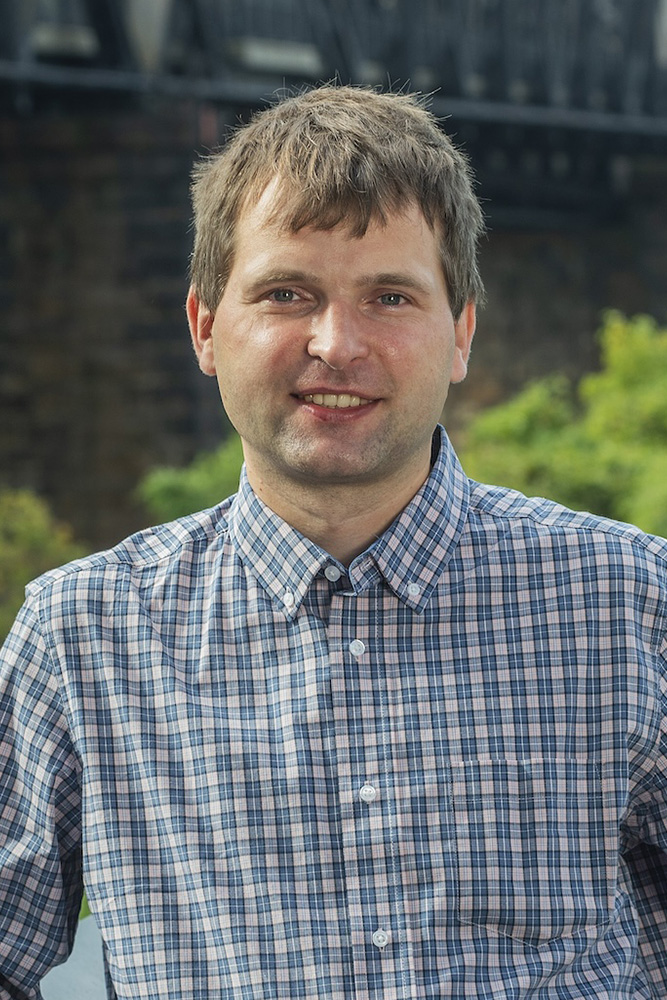
"Targeting Age-Related Metabolic Dysfunction to Extend Healthspan"
Speaker:
Assistant Professor, Aging Institute of UPMC, Division of Endocrinology and Metabolism
Date: January 27, 2026, noon-1 p.m.
Location: Roy Blunt NextGen Precision Health Building, Atkins Family Seminar Room
Description
People today are living longer than ever before, although the biology of aging remains only partially understood. What we do know is that over time, subtle changes occur within our cells, causing them to lose efficiency in repairing damage and producing energy. Scientists have discovered that metabolismтthe process that converts food into energyтplays a central role in these age-related changes.
, an assistant professor at the University of Pittsburgh, is at the forefront of this research. His lab investigates how metabolism changes as organisms age and how adjusting these pathways could help slow or even reverse parts of the aging process. Beyond discovery, Parkhitkoтs work is driven by a strong translational focusтhe explains, тI have a very translational mind. My biggest achievement is when research can actually be used in humans.т
Using fruit flies (Drosophila) as a model, Parkhitkoтs team studies how specific amino acids, like tyrosine, affect longevity. He emphasizes that working with fruit flies тgives you a power to discover things you were probably missing,т due to their short 60-80 day lifespan, the ease of gene manipulation, and the striking similarities between human and fly aging pathways. Through these experiments, Parkhitko and his team have discovered that as we age, certain molecules build up in our cells and interfere with normal chemical reactions. Specifically, they found that the metabolism of the amino acid methionine is highly affected with aging.
тI always was interested more in the mechanistic aspect,т notes Parkhitko, тwhere you donтt just describe what happensтyou target these changes and ask if theyтre causal or correlational.т This perspective has shaped Parkhitkoтs pioneering approach to studying metabolism as an interconnected network rather than a collection of isolated pathways. While many aging studies focus on a single molecule or enzyme, Parkhitkoтs lab looks at how multiple chemical pathways interact and influence one another over time. To do this, his team uses advanced genetic tools, which lets them turn several genes on or off simultaneously. They combine these tools with metabolomics, a technology that measures hundreds of small molecules inside cells to capture how the bodyтs chemistry changes with age.
Parkhitko also applies these methods to understand how metabolism changes in the brain, especially in neurodegenerative disorders associated with aging such as Alzheimer's and Parkinsonтs disease. His findings suggest that while aging and neurodegeneration share certain metabolic patterns, they also involve distinct chemical changes. This insight helps scientists distinguish between normal aging and disease processes, an important step toward developing targeted therapies that could preserve brain health later in life.
About the Speaker

Dr. Andrey A. Parkhitko earned his PhD in Cancer Biology and Metabolism from Russian State Medical University, one of the premier medical schools in Russia. During his last year at RSMU, he was selected to work in the U.S. for one year in Dr. Henskeтs laboratory at the Fox Chase Cancer Center, Philadelphia, PA. After completing his masterтs thesis project, he was invited to continue his project at the Brigham and Womenтs Hospital and Harvard Medical School in Boston, MA where Dr. Henskeтs lab had moved. His Ph.D. thesis focused on the role of autophagy in the treatment of Tuberous Sclerosis Complex. For postdoctoral training, Andrey joined Dr. Norbert Perrimonтs lab, also at Harvard Medical School, to study how metabolism changes during aging in Drosophila, and how these changes could be targeted to extend lifespan and suppress age-dependent diseases. During his postdoctoral training, he was awarded the LAM Foundation Fellowship Award and the NIH Pathway to Independence Award (K99/R00). In 2020, Andrey was appointed to the rank of Assistant Professor at the Aging Institute at the University of Pittsburgh School of Medicine.
His research interest is how metabolism is reprogrammed with aging and how age-dependent metabolic changes can be targeted to extend health- and lifespan. Using Drosophila as a model system, he demonstrated that aging is characterized by extensive reprogramming of methionine metabolism and delayed processing of SAH, a competitive inhibitor of a broad spectrum of methyltransferases. He is also interested in whether тresettingт the methionine and tyrosine metabolic pathways back to a more youthful state can be translated to delay aging of higher organisms and improve phenotypes related to Alzheimerтs disease.
| Thanks to for their media partnership. |
 |
About the Discovery Series
provides learning opportunities for UM System faculty and staff across disciplines, the statewide community and our other partners to learn about the scope of precision health research and identify potential collaborative opportunities. The series consists of monthly lectures geared toward a broad multidisciplinary audience so all can participate and appreciate the spectrum of precision health efforts.
For questions about this event or any others in the Discovery Series, please reach out to Mackenzie Lynch.
Reviewed 2025-10-21